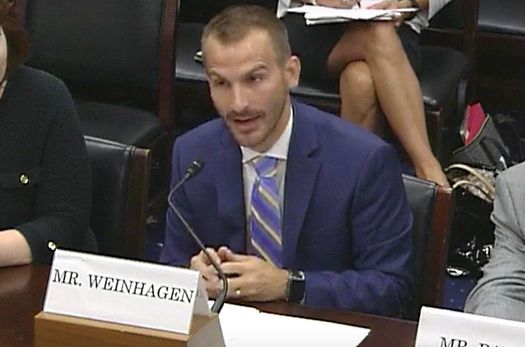Business Leaders Spotlight Power of 2020 Census as “Big Data for Small Business”
ReadyNation Member Jonathan Weinhagen explained the business need for a full and accurate count
Related
If you thumb through Jonathan Weinhagen’s scrapbook from his family’s auto repair business, you’ll see four generations of mechanics hard at work under the hood. You’ll also hear about the many ways the family has long-depended on sound data about potential customers and the marketplace around them to drive that business forward.
Lawmakers in Washington got a glimpse of that story on Thursday, June 20 when Weinhagen described how much knowledge and wisdom his family has gained by tapping readily available data from the U.S. Census Bureau over the years. They also heard Weinhagen and other business leaders speak candidly about the economic jeopardy facing private sector enterprises nationwide if the 2020 Census is inaccurate.

Weinhagen is among many ReadyNation members whose views are shared in the ReadyNation “Business Counts: How Business Can Contribute to an Accurate 2020 Census” report, and in the additional materials available here.
The business leaders are concerned because in 2020, for the first time, the U.S. Census Bureau will be encouraging U.S. residents to complete their questionnaires online. While this aims to improve cost efficiency, the process and others in this upcoming census depend on strong cybersecurity and new technologies that may not have been adequately tested once the count begins. Business leaders are also concerned about reaching the nation’s significant “hard-to-count” population, which includes many households with unreliable or non-existent Internet access.
Weinhagen, who now serves as President & CEO of the Minneapolis Chamber of Commerce, described how small business owners such as his father and 80 percent of the Chamber members he represents depend on census data for several types of decisions, including:
- Opening a store in the best location that is accessible for their customers.
- Offering the products and services that residents living or working nearby want and need in their daily lives.
- Locating a new office or facility close to neighborhoods with skilled workers.
“All of these decisions are based, in part on information that only comes from the census,” he said. “Even if a company were to use private commercial data, that company would need a benchmark to ensure it’s accurate. Since the census is the most robust snapshot of everyone living in the U.S., it’s the best available benchmark. There’s no other data source like it.”
“Essentially, census data is ‘big data” for small businesses,’ he added. “Which is why it’s extremely important that it be accurate.”
Weinhagen and others also spoke of what happens if the census doesn’t deliver, referring to “a domino effect” that could stifle local economies, rob local communities of needed investment, and deprive states and communities of their share of $800 billion distributed annually for federal programs that build roads, strengthen schools and contribute to a healthy workforce.
The Minneapolis Chamber leader is one of more than 30 business leaders who are members of the Business for the 2020 Census Task Force. All are participating in a major effort to encourage Congress to provide adequate funding to prepare for the 2020 Census and to urge businesses and other employers to mount public education campaigns that encourage employees, customers and other stakeholders to complete their census forms.
Weinhagen also shared a letter signed by 75 representatives of small businesses and large enterprises calling on Congress to support accurate census funding to ensure an accurate count. He discussed these views in more detail with Committee Chairman Andy Kim (D-NJ), Ranking Member Kevin Hern (R-OK), and Rep. Pete Stauber (R-MN).
He was joined at the hearing by:
Darrin Conroy, Library Director, New York Small Business Development Center, Albany, NY James Whittier Parker, President, Riverview Studios, Bordentown, NJ (for New Jersey Main Street) Jill Dietz, Regional Center Director Statewide Services, Oklahoma Small Business Development Centers
Click here to learn about the many ways U.S. businesses and other types of employers are tapping their networks to encourage employees, customers and other stakeholders to complete their census forms.
Click here to learn about the ReadyNation Business Leaders for the 2020 Census Task Force.
Read More About
